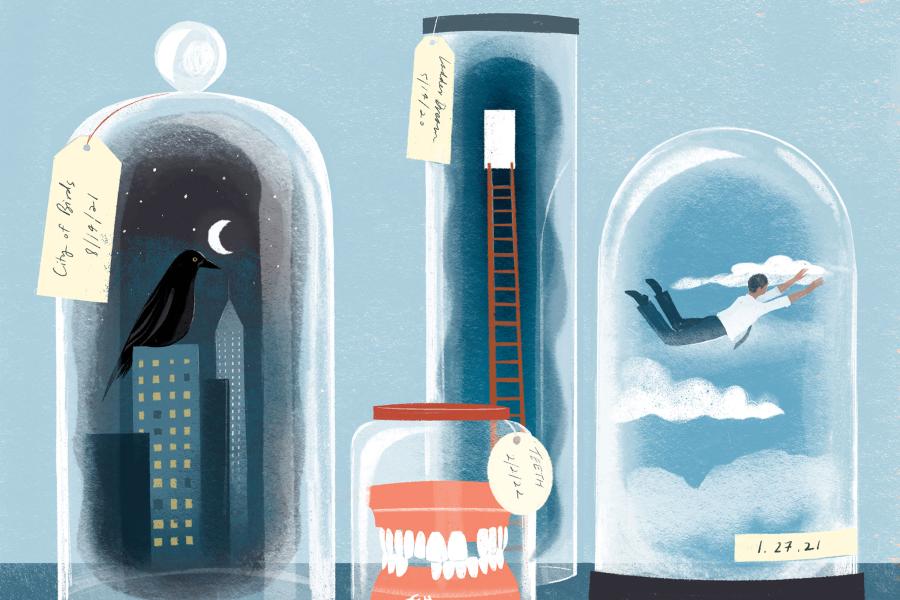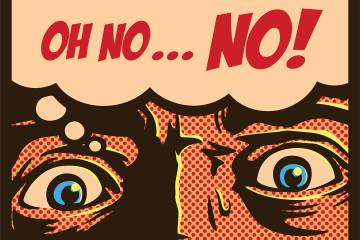Consider Dylan Selterman among the few people who truly, genuinely, can't wait to hear all about your dream. Teeth falling out? Do tell. Unprepared for a final exam? Sure. His ears especially perk up when he hears someone say they've woken up angry about something their romantic partner did in a dream.
You can classify Selterman, an associate teaching professor in the Department of Psychological and Brain Sciences, as Johns Hopkins' new resident dream expert. Earlier this year, he brought to Hopkins his DREAM—that's short for Dreams, Relationships, Emotions, Attraction, and Morality—Lab, which studies what our dreams might be telling us, the psychology of attraction and infidelity, and how the two often overlap.
"Just doing projects where I get to actually study this and look at people's dreams and try to make sense of them—and try to see patterns in dreams—it's really fascinating," says Selterman on how he came to the field. But, he adds, "the more personal story is that one of my ex-girlfriends had very bad dreams about me, and then she would be upset at me the next day because of things I did to her in her dream."
Selterman, at the time a psychology graduate student at Stony Brook University, started researching how a person's dreams about their partner bleed into their behavior the next day. Published in Social Psychological and Personality Science in 2013, his analysis of more than 800 dreams found that people who dreamed about cheating felt significantly less close to their partner the next day. Among those who felt jealous in their dreams, there was more conflict with their partners after waking up. In post-study interviews, he says, a couple of participants said it even led them to break up.
As for the why—why we dream the things we dream, or why we dream at all—Selterman says the science is still out. "There is no grand, unified theory of dreams that all scientists are in agreement about," he says. There's the continuity hypothesis, which says your dreams are a reflection of what's happening in your day-to-day life. Did you fall asleep watching the NBA playoffs? Makes sense that you'd dream about playing basketball. Another theory posits that dreams promote social bonds, making us feel closer to family and friends. But Selterman suggests we consider another possibility: that dreams exist to help us solve our problems—to process conflict, to conceptualize solutions we couldn't or wouldn't come up with while in a fully conscious state.
In the case of his Stony Brook study, a dream about infidelity or conflict might nudge the person to break up with their partner. On the flip side, a dream looking back at a relationship's first date could result in deepened romantic bonds. Or, in the case of a new study Selterman is working on about ultravivid dreams in the early days of COVID-19, a dream about getting sick might lead someone to wash their hands more often or remember to mask up in public spaces.
There's a fair amount of speculation when it comes to dream talk, and Selterman concedes that conducting definitive scientific research on dreams is a tricky undertaking. For one, you're relying on people to self-report—that is, to have accurate memory recall, even if that means asking them to journal immediately after waking up at 3 a.m. And securing funding for this kind of work isn't easy. "It's not like NIH is giving out million dollar grants to study dreams," he says. "That's just not a thing."
If all this talk about dreams as a way to work through our waking problems sounds, well, a bit exhausting, Selterman suggests we rethink our nightly snooze as an "active rest." Although your digestive system and breathing slow during sleep, he says, your brain remains remarkably active.
"If you put people into a situation where they're able to be physically relaxed and not have their minds consumed with an active process like work or hobbies, their mind is free—liberated—to go in other directions," he says. "There's a lot going on when we sleep. I think people underestimate that."









